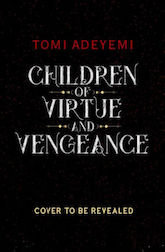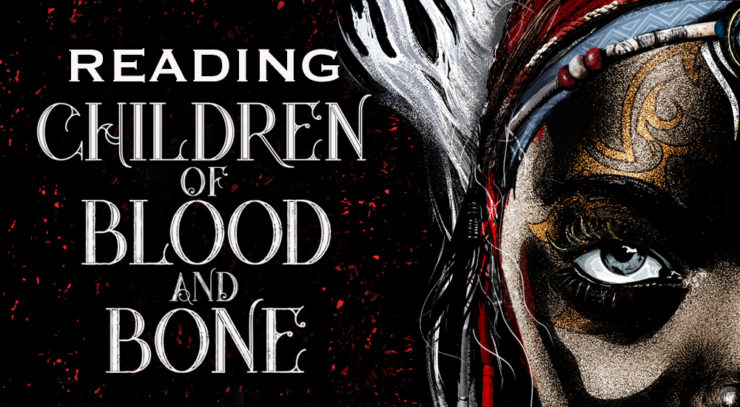The reread of Children of Blood and Bone by Tomi Adeyemi continues with chapters 9-17, in which Inan goes heavy on the self-loathing, Amari makes some sacrifices, Tzain moves into Grumpy Town, and Zélie levels up.
Recap
Now back in Ilorin, the trio head to Mama Agba. The scroll awakens her Seer powers and restores her ashê. Her first vision is one of Zélie, Amari, and Tzain on the road to Chândomblé to find answers. None of the teens want to go, but they barely have time to discuss it before a fire breaks out. It’s Inan! Zélie dreams of the day when Tiders and Burners could defend her people. In a rage she threatens to kill Amari, but they fall into the ocean as a wooden platform collapses.
After they reach the shoreline, Zélie is wracked with guilt over the deaths of Bisi and her family. A flicker of fury burns in her as she places the blame on the royal family. Mama Agba and Baba send the kids off to meet their destiny and escape together, with promises to meet again soon.
Inan is not having a good day. First he’s had to deal with Amari’s theft, then the Ilorin fire, and now he has magic. Of course we know Zélie couldn’t infect him—he touched the scroll, which awakened his latent powers—but he doesn’t know that… or maybe he just isn’t ready to entertain other options. Regardless, he now has magic powers that have bonded him with Zélie and given him the ability to feel what the villagers are feeling.
When Zélie, Amari, and Tzain stop for a rest and Zélie is pulled into Inan’s dreamscape, it’s confirmed: He’s a Connector. But what gives with the white streak in his hair? His whole head should be white like hers. Inan’s magic isn’t playing by the rules as Zélie understands them, but she’s smart enough to know that he’ll stop at nothing to keep his secret shame from his father. That makes him even more dangerous.
At the legendary temple, now in ruins, Zélie’s magic helps her to feel the spirit of one of the many dead people strewn about the grounds. They find a way in, but before they get too far they’re knocked out with poison gas. When they wake, they’re tied together in a cave. A sêntaro called Lekan interrogates them at first, but then leads them deep underground…
Commentary
I gotta say, Inan is wound waaaaaaaay too tight. He spends most of chapters 14 and 16 fuming internally over Zélie, hating himself for failing at the impossible task he’s set for himself, trying to keep his magic a secret, and lying to Kaea. This won’t end well for him, that’s for sure.
Also, Inan’s extreme reaction to the realization he has magic and how it threatens his racial supremacy and cultural identity is fascinating. I’m reminded of how some white people get angry at the discovery that the white majority will soon become a minority in the U.S. Why be angry about it? Because that demographic shift not only means that their cultural supremacy is slipping but also because being a minority has historically not been a pleasant experience overall. This is a nation founded on the key principle that some people have rights and others don’t. Hell, we had to pass several constitutional amendments and fight for countless laws, ordinances, propositions, and court decisions just to get to the shaky point we’re at today, and much of that ground can easily be lost with a few executive orders. Of course the majority don’t want to be minorities—not after what they’ve done (and continue to do) to those of us who’ve historically been left out of the dominant group.
Buy the Book


Children of Virtue and Vengeance
What is the impact of Amari’s reluctance to use her privilege? Tzain is willing to cut her some slack because “she hasn’t done anything wrong.” Zélie isn’t exactly the forgive-and-forget type, but she has a point when she retorts that Amari also “hasn’t done anything right, either.” It’s not enough to say you don’t like oppression or insist you can’t be racist because you have a Black friend. Superficial declarations don’t fix a rotten system.
Although this will change soon, at the moment Amari is not on this journey because she genuinely believes in Zélie’s cause. She doesn’t disagree with it, but she’s not yet ready to sacrifice herself for it. She’s the equivalent of all those people who decry public outrage and protest and demand that the oppressed “be civil.” Zélie’s rage is getting the better of her, but she’s right that you can’t half-ass a revolution. Amari cannot hide behind her privilege and save the divîners at the same time.
To be fair to Amari, all this is new for her. Yesterday she was a bored socialite, today a rebel. She not only has to learn everything about how the world really works, but she also has to unlearn everything her parents taught her. She has a lot of catching up to do, but despite a few stumbles, she’s open to new perspectives. By letting Zélie see Amari’s scars, Adeyemi points out that having privilege doesn’t automatically mean having the perfect life. Privilege is systemic, not individual, although individuals both benefit from and prop it the system. The privileged can suffer hardships, but they’ll always have the system as a safety net in a way others do not.
It’s also worth examining Inan and Amari in their role as survivors of child abuse. It doesn’t appear that their father physically assaults them anymore, but the verbal and emotional abuse certainly continues. They know no other life—especially Amari, who’s been trapped in the palace until now. Saran’s anger at losing his first family to maji is understandable. What isn’t, however, is his cruel, brutal reaction to his loss and his treatment of his replacement heirs. Tragedy doesn’t simply turn a good man into an evil one. Saran has gone out of his way on every occasion to be the biggest asshole in Orïsha, even to his own offspring. Amari seems to have been spared the vilest emotional abuse, leaving her self-esteem relatively intact, but even she has a hard time seeing herself as valuable and meaningful.
Terminology
- Aríran: the maji of time. The name comes from the Yorùbá word for a seer or someone who sees the future.
- Babalúayé: god of Healers and Cancers. Based on Babalú Ayé, an òrìṣà of illness, disease, and healing.
- Èmí: the maji of mind, spirit, and dreams. The name comes from ẹmi, the Yorùbá word for “spirit.”
- Iná: the maji of fire. The name comes from the Yorùbá word for trade or barter.
- Ìwòsàn: maji of health and disease. Google Translate says it means “healing” in Yorùbá, but I haven’t been able to confirm that.
- Omi: the maji of water. The name comes from the Yorùbá word for water.
- Orí: deity of Connectors. Based on Orí, an òrìṣà that is similar to the Western conception of a soul.
- Orúnmila: god of Seers. Based on Orúnmila, the òrìṣà of knowledge and divination that was present at the creation of the universe.
- Sàngó: deity of the Burners. Based on Ṣàngó, an angry òrìṣà of thunder and lightning.
- Yemọja: goddess of the Tiders. Based on Yemọja, an òrìṣà that protects women and is tied to the moon, water, secret keeping, and motherhood/conception.
Place names
- Apâdi: hell. Inspired by ọrun apadi, a Yorùbá phrase for “heaven of potsherds,” aka the Bad Place.
- Chândomblé: the temple headquarters of the sèntaros, “the protectors of magic and spiritual order.” The name likely comes from Candomblé, an Afro-Brazilian religious sect based on traditions from Fon, Bantu, and Yorùbá belief systems.
- Sokoto: a trading town. Inspired by Sokoto, the capital of Sokoto State, Nigeria; the name is derived from the Arabic word for “market.”
Things are heating up for our trio of heroes. Now that Zélie is a full-fledged maji—or at least as close to one as they’re gonna get until they complete the ritual on the disappearing island—her connection with Inan is about to get hella intense. Not to mention the fact that they have to travel from one end of Orïsha to the other in three weeks or ALL HOPE IS FOREVER LOST. No pressure, y’all.
Next week we’re discussing chapters 18-30.
Alex Brown is a high school librarian by day, local historian by night, author and writer by passion, and an ace/aro Black woman all the time. Keep up with her every move on Twitter and Insta, or follow along with her reading adventures on her blog.










